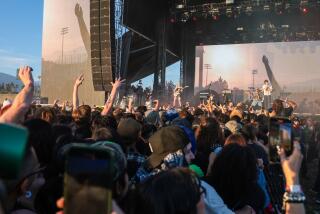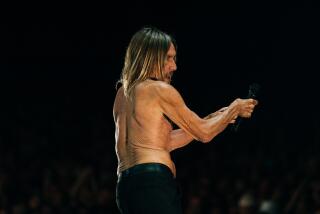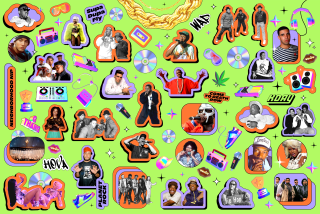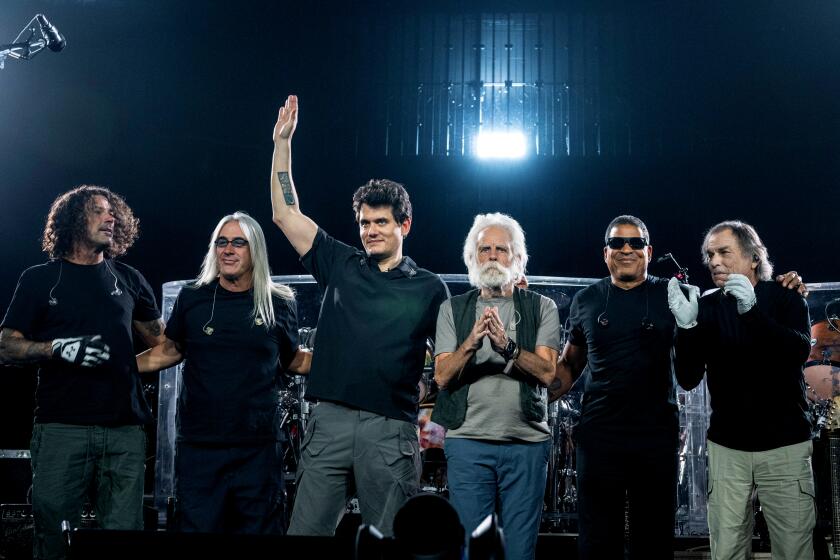POP MUSIC REVIEW : Canned Heat Returns With Smoky Blues : L.A. Hippie Band Stresses Roots, Not Countercultural Excess, in Lively Set at Fullerton’s Goodies
In terms of potential hideousness, the imagined prospect of a 1989 Canned Heat show would have to rank high. Even in its late ‘60s heyday, the L.A.-based band offered a not-always-palatable mash of blues purism (both original front men Bob (the Bear) Hite and Alan (Blind Owl) Wilson were regarded experts on blues lore) and counterculture excess, with Hite’s lyrics positing hippies as the new oppressed race and the band’s boogie rhythms fuzzed up through 200-watt amps larger than some blues men’s homes.
That combination appealed enough at the time--the group was a hit at both the Monterey Pop Festival and Woodstock--but here in the age of rank oldies cash-ins, and featuring only the original bass player and nearly original drummer (Wilson died in 1970, Hite in 1981, and guitarist Henry (Sunflower) Vestine is long gone from the band), Canned Heat’s show at Goodies in Fullerton Sunday night seemed more likely to live up to the band’s first name than its second.
But, while the new Canned Heat made its obligatory nods to the past--even whipping out a wood flute for “Going Up the Country”--there wasn’t a whiff of patchouli in the smoky blues pouring from the quartet. The 10-song set seemed more intent on keeping the blues alive today than in exhuming its past.
The group has a very capable, if not entirely captivating, front man in singer/harmonica player/slide guitarist James Thornberry. In snaring Orange County’s Junior Watson (late of the Mighty Flyers) last year, the band may have gained the best blues guitarist now working in the state.
Thornberry claimed even such Hite staples as “Let’s Work Together” as his own with a thick, grainy voice, and his harmonica playing achieved a furious intensity on an extended boogie number. On occasion, though, his playing veered toward accuracy rather than passion.
Watson’s playing nearly always hit an emotional mark--and hammered it steadily on the showcase instrumental, “Hucklebuck”--but it generally arrived there by thoroughly devious means: Instead of going for obvious killer lines, Watson consistently achieved a tension by taking unexpected byways, using a delightfully skewed logic to sift through a musical vocabulary encompassing delta blues, be-bop and the wild-hair country-jazz keenings of Jimmy Bryant.
With the exception of the long boogie number, the band’s standards were solidly delivered, with drummer Fito de la Parra taking over Wilson’s reedy falsetto in “On the Road Again” and “Goin’ Up the Country.” Requisite bass and drum solos were delivered with dispatch, though both de la Parra and bassist Larry Taylor (who has provided a foundation for everyone from the Monkees to Tom Waits) seemed happier laying down a solid bottom through the set.
The five songs taken from its new album, “Reheated” (available only as a German import), suggested that the band could easily forgo its catalogue numbers if it chose. Both a stewing version of “Mercury Blues” and the T-Birdish encore of New Orleans pianist Ronnie Barron’s “Looking for the Party” were as fresh as anything else on the current blues scene.
More to Read
The biggest entertainment stories
Get our big stories about Hollywood, film, television, music, arts, culture and more right in your inbox as soon as they publish.
You may occasionally receive promotional content from the Los Angeles Times.









